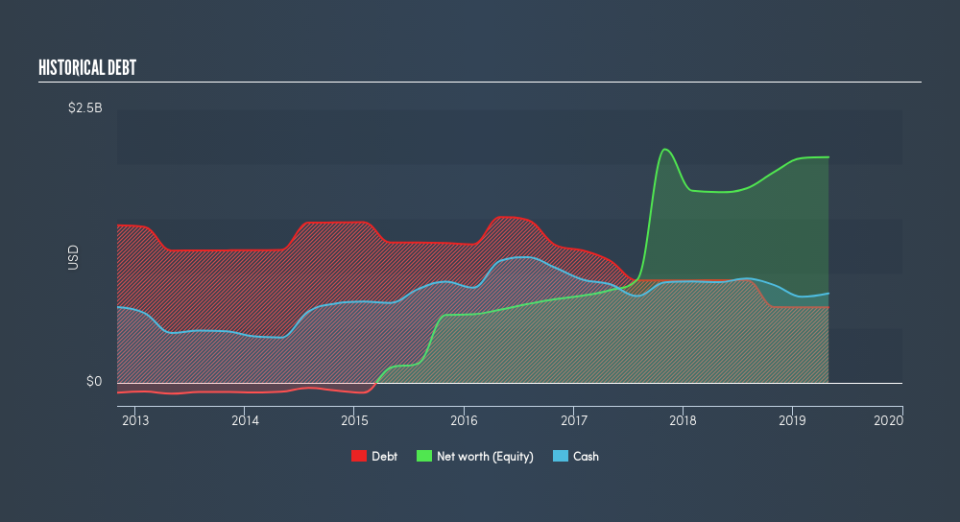Ciena (NYSE:CIEN) Seems To Use Debt Rather Sparingly

David Iben put it well when he said, 'Volatility is not a risk we care about. What we care about is avoiding the permanent loss of capital.' When we think about how risky a company is, we always like to look at its use of debt, since debt overload can lead to ruin. We note that Ciena Corporation (NYSE:CIEN) does have debt on its balance sheet. But should shareholders be worried about its use of debt?
What Risk Does Debt Bring?
Debt is a tool to help businesses grow, but if a business is incapable of paying off its lenders, then it exists at their mercy. Ultimately, if the company can't fulfill its legal obligations to repay debt, shareholders could walk away with nothing. However, a more usual (but still expensive) situation is where a company must dilute shareholders at a cheap share price simply to get debt under control. Of course, plenty of companies use debt to fund growth, without any negative consequences. When we examine debt levels, we first consider both cash and debt levels, together.
See our latest analysis for Ciena
How Much Debt Does Ciena Carry?
You can click the graphic below for the historical numbers, but it shows that Ciena had US$622.2m of debt in April 2019, down from US$942.6m, one year before. But it also has US$818.5m in cash to offset that, meaning it has US$196.3m net cash.
How Healthy Is Ciena's Balance Sheet?
The latest balance sheet data shows that Ciena had liabilities of US$769.4m due within a year, and liabilities of US$854.2m falling due after that. Offsetting this, it had US$818.5m in cash and US$842.6m in receivables that were due within 12 months. So it actually has US$37.5m more liquid assets than total liabilities.
Having regard to Ciena's size, it seems that its liquid assets are well balanced with its total liabilities. So it's very unlikely that the US$6.43b company is short on cash, but still worth keeping an eye on the balance sheet. Simply put, the fact that Ciena has more cash than debt is arguably a good indication that it can manage its debt safely.
In addition to that, we're happy to report that Ciena has boosted its EBIT by 68%, thus reducing the spectre of future debt repayments. The balance sheet is clearly the area to focus on when you are analysing debt. But it is future earnings, more than anything, that will determine Ciena's ability to maintain a healthy balance sheet going forward. So if you want to see what the professionals think, you might find this free report on analyst profit forecasts to be interesting.
Finally, a business needs free cash flow to pay off debt; accounting profits just don't cut it. Ciena may have net cash on the balance sheet, but it is still interesting to look at how well the business converts its earnings before interest and tax (EBIT) to free cash flow, because that will influence both its need for, and its capacity to manage debt. During the last three years, Ciena produced sturdy free cash flow equating to 70% of its EBIT, about what we'd expect. This free cash flow puts the company in a good position to pay down debt, when appropriate.
Summing up
While it is always sensible to investigate a company's debt, in this case Ciena has US$196m in net cash and a decent-looking balance sheet. And we liked the look of last year's 68% year-on-year EBIT growth. So we don't think Ciena's use of debt is risky. Another factor that would give us confidence in Ciena would be if insiders have been buying shares: if you're conscious of that signal too, you can find out instantly by clicking this link.
If, after all that, you're more interested in a fast growing company with a rock-solid balance sheet, then check out our list of net cash growth stocks without delay.
We aim to bring you long-term focused research analysis driven by fundamental data. Note that our analysis may not factor in the latest price-sensitive company announcements or qualitative material.
If you spot an error that warrants correction, please contact the editor at editorial-team@simplywallst.com. This article by Simply Wall St is general in nature. It does not constitute a recommendation to buy or sell any stock, and does not take account of your objectives, or your financial situation. Simply Wall St has no position in the stocks mentioned. Thank you for reading.

